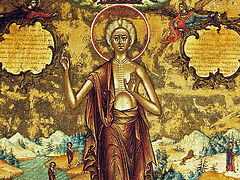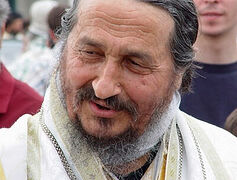 Saint Mary of Egypt by Jusepe de Ribera, 1641 As you, beloved brothers and sisters, see and hear, this Great Canon of St. Andrew of Crete is filled to the utmost with a spirit of profound repentance. And the great holy hierarch of the Orthodox Church, St. Andrew of Crete, condemning himself for everything, humbles himself before God, and like the worst sinner asks God to forgive his sins.
Saint Mary of Egypt by Jusepe de Ribera, 1641 As you, beloved brothers and sisters, see and hear, this Great Canon of St. Andrew of Crete is filled to the utmost with a spirit of profound repentance. And the great holy hierarch of the Orthodox Church, St. Andrew of Crete, condemning himself for everything, humbles himself before God, and like the worst sinner asks God to forgive his sins.
It happens in life that a person suddenly begins to have pangs of conscience which eat him up. And in particular, it is felt very keenly when a person previously lived a relaxed life, thinking neither about God, nor about his soul, nor about eternity—he cared about nothing! But then the True Light suddenly shone in his soul and he saw, in the light of this truth, all his wretchedness. The Church meets the sinner halfway, when conscious of his extreme irresponsibility and guilt, with examples of those who repented and by their repentance he manages to rise from the abyss of sin directly to Heaven. Therefore, a penitent should never despair. You need to humble yourself when sins bother your conscience, when your soul aches from them—you should humble yourself before God, acknowledging that you are absolutely contemptible and worthless—but without despairing.
We hear in this Canon about the Venerable Mary of Egypt. It seems it would have been impossible to fall lower than she did—to the point of complete desecration of a woman’s honor and dignity. But repentance made her Christ’s bride, as the Church proclaims. The Venerable Zosimas, himself a great righteous man, saw her cross the Jordan as if on dry land and ascend from earth to heaven in prayer. This is what repentance does to all who sincerely repent.
One preacher points to another example. St. Mary’s repentance was long-term: she had sinned for a long time, and she repented even longer until she truly became “an earthly angel and a Heavenly person.” But the preacher points to another example—that of the Good Thief who did not offer such repentance as St. Mary did, but he came to his senses only on the Cross while in agony, a few hours before his death. And yet, what did he hear? He only begged the Lord to remember him and not forget about him when He would come into His Kingdom. And since (we have said it more than once) our Lord loves to give more than He is asked, he heard the answer: “today”—not “when I come”, but “today”. Today shalt thou be with Me in Paradise (Lk. 23:43). Pointing to this example of how this man (who had sinned all his life, but only came to his senses at its very end) was accepted, the preacher said that if the Good Thief's repentance was accepted, an Orthodox Christian has no right to despair, no right to fear that his repentance will not be accepted.
We have cited here the words of St. John Chrysostom, whom the Church calls the “preacher of repentance”, because the holy hierarch liked to emphasize that where there is repentance, there must be God’s mercy. The Lord has, as it were, knit together His mercy with someone’s repentance. It is no coincidence that even in the Old Testament He said that if people came to Him with sincere repentance, then, as God said: Though your sins be as scarlet, they shall be as white as snow; though they be red like crimson, they shall be as wool (Is. 1:18). At the same time, while being conscious of your sinfulness, keep in mind that genuine repentance is not just a sorrowful and despondent feeling, but a sincere awareness of your sinfulness and corruption; and it is also joy, because we know that if we sincerely repent, the Lord will not reject us and will accept us as He accepted the Prodigal Son. Amen.




